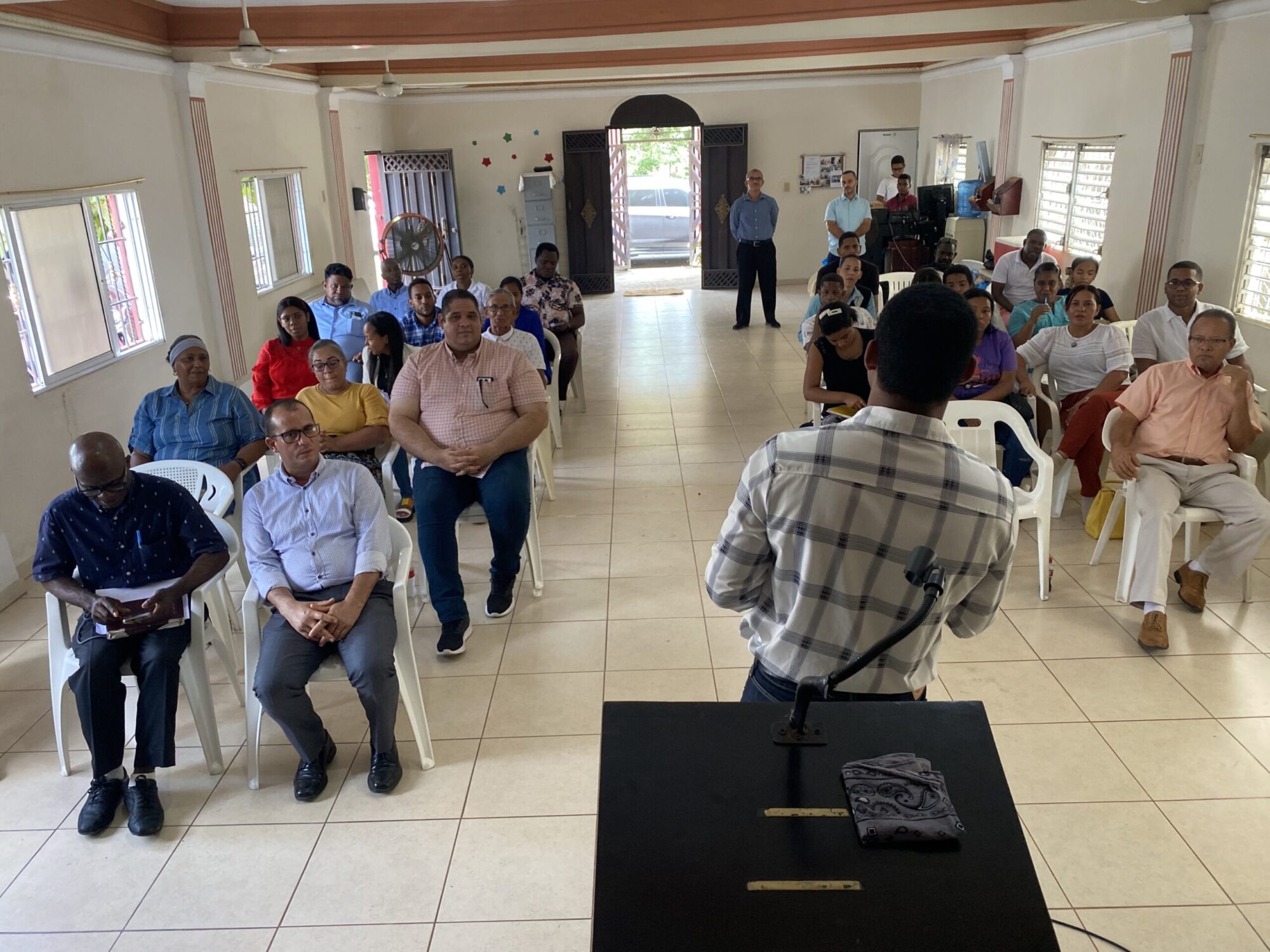The Command is to Send Missionaries, Not Just Receive Them:
For The Church In Latin American
Is your church a missionary church? Are you committed to praying for your brother or sister from your church? Are you giving towards or preparing them to go on a mission trip? Do you have a desire to work in missions?
In many Latin American countries, we have seen great missionary efforts from groups and individuals from various foreign organizations. Many churches have received groups of “missionaries.” Some have met missionaries personally who work in their town. Others have met them even in their local church. Many of the people I have met here in the Dominican Republic have been the fruit of these missionary efforts. Of course, what has been done in Latin America has happened despite the problems of the region. Also, we can’t deny that God has used them despite these many difficulties. By God’s grace, the church arrived. Today, we have worshipers of Jesus Christ in Latin America for this reason. Does it have its problems? Yes. Is there work to be done? Very much! But we give thanks and glory to God first for that.
Nonetheless, there is something worrying that happened with the “passing of the torch of the gospel.” The vision fell short in many places, or the mission was not communicated well in its fullness. When a people recognizes their responsibility to reach their population with the gospel, they are headed in the right direction. But it must be understood that within the mandate remains the element of going beyond, and we can’t ignore it. So we must define the terms.
What happened after the transfer of that sacred truth? How did the gospel change as it passed from one distant land to another? Why do many countries receive missionaries? Generally speaking, very few in Latin America are sending missionaries to other places. Many believe that evangelizing their own people is enough. They think bringing the gospel to other places in their own country is enough to participate in the Great Commission. For many, this is their concept of missions, and it falls short.
I have personally witnessed national “mission” campaigns by a certain denomination. They focused their entire month of missions on encouraging people to share the gospel in their neighborhoods. Where most of their neighbors were exactly like them. I applaud the effort, but it was am emphasis on evangelism, not missions. I once was asked to speak at a church who was participating. I was the only missionary there. I was gentle and loving. However, I clearly stated that the day’s activities focused more on evangelism. I also emphasized that we shouldn’t stop there. I remember receiving many blank stares after saying that. Their concept of missions was actually evangelism. We must define the terms.
Let’s see what the gospel of Matthew 28:18-20 says:
“Jesus came near and said to them, “All authority has been given to me in heaven and on earth. Go, therefore, and make disciples of all nations, baptizing them in the name of the Father and of the Son and of the Holy Spirit, teaching them to observe everything I have commanded you. And remember, I am with you always, to the end of the age.”
Some brief observations:
Jesus declares his supreme authority before His disciples.
Based on that authority, Jesus gives orders to his disciples that include:
Going to other places
Making disciples of all nations (πάντα τὰ ἔθνη), groups with ethnolinguistic and cultural differences, within any nation, and outside in other nations as well.
Baptizing believers.
Teaching them to obey Jesus.
Jesus promises to be with us always.
A biblical church should understand the importance of evangelizing. It should also grasp the concept of making disciples. This includes teaching new believers how to follow Christ. Many grasp the ordinance of baptism. They also recognize the importance of growing in knowledge and obedience to the teachings of our Lord.
But for one reason or another, we have failed greatly in a vitally important element of the Great Commission. The mandate includes going beyond, to people different from us. I am referring to an intentionally transcultural ministry. It crosses ethnolinguistic and geographical barriers. This ministry intentionally brings the gospel to people different from us. It starts the same process with them as was done when the gospel came to our context. Some churches have managed to send a few. However, if we are honest about the big picture, these churches are few.
Where do we start?
First, the most practical and natural thing is to reach out to people in our families, neighbors, coworkers, etc. But that’s really just evangelism. We need to have a plan to reach out to foreigners and make disciples of them as well. Maybe your church doesn’t have the resources to go, or support sending someone to a faraway land. But have you ever thought about the foreigners who live in your community, in your city? Groups that are usually looked down upon. They need the gospel too. And that would be a perfect example of participating in missions locally.
How would you feel if I shared, with great sadness? I heard a pastor saying he is not interested in reaching out to “those people.” (Speaking of a certain nationality of people from a neighboring land.) This man then said that, “They can visit my church if they want, but I will not reach out to them beyond that.”
“Those people!” At that moment, my heart was broken. This pastor, who I respected much more before that moment, was contradicting part of the mandate of Jesus. The most ironic thing is that missionaries from other countries brought the gospel to his country. Without them, he would not have the hope he has now. Thank God that the brothers who reached this man’s country did not think the same way.
Why it is important to define the terms?
If we do not understand that the Great Commission intends to propel outward, we are missing its essence. It aims to reach people different from us where we live. It also aims to reach other ethnicities outside our borders. Without this understanding, we do not grasp the concept of missions.
In short, evangelizing is bringing the gospel to our own people and of course that is very important. According to the biblical pattern, missions could be defined differently. They are “the intentional crossing of cultural barriers to preach the gospel and disciple.”
We are wrong if we think that evangelizing people of our own culture is the entire mission. In reality, it is only a part of the mission. The text does not present us with the luxury of only working here or there, one group or another. It is both. The Lord with all authority in heaven and on earth said to “all nations, to all the world.” And I repeat, that was a command, not a suggestion. The King of kings has given His orders; period. I agree with John Piper when speaking about missions, he says the following:
“We only have three options, to go, to send, or to disobey.”
It is key that we can understand this, missions should not be optional for the church.
Below, I present evidences that show that many churches have lost focus. You will then see some practical suggestions. These suggestions can help take the Great Commission more seriously. They can do this in your local churches, even with the few resources that many churches have.
Evidences that we have lost focus of the mission
Churches with growth invest their resources in secondary matters. Sometimes, they even go into debt. They focus on things such as better equipment, larger church buildings, and a multitude of fun activities. I must clarify to avoid misinterpretation. These are good things. None of them are sinful in and of themselves. I would never say something like that. But, if I ask you to honestly examine our priorities. The budgets of each church reveal a lot about the true priorities of any ministry. If we take the words of the Lord seriously, the Great Commission should be one of those priorities.
Evidences that we have lost focus of the mission:
- Receiving missionaries from other countries who come and help. Yet, lacking any urgency to understand the need to imitate that sacrifice and dedication for others. What we have received was never only for us.
- No long-term plan to prepare and send missionaries from local churches.
- No funds allocated in the church budget to support some people who are already working in the mission field.
- No place on your prayer list for missionaries in other countries. No place for the Lord to raise up missionaries from your congregation to give themselves on the mission field.
It’s time for us some of us to learn to obey the Lord and step outside our comfort zones. This is God’s plan. We should not give ourselves the luxury of ignoring the most difficult parts of following Christ. Let us remember that in the book of Acts, the disciples faced persecution. They endured it to spread the gospel to other cities and nations. We should not expect anything different for us.
Some suggestions for adjusting our focus and beginning to participate in the Great Commission:
- Firstly, we must pray. Let us pray for missionaries in other countries. Brothers and sisters who give their lives in contexts much more difficult than ours.
- Let us pray that the Lord will put a passion in the hearts of His church. May they be willing to go and make disciples of other nations.
- Let us pray for provision so that we can support missionaries and eventually send others. Faithfulness is more important than quantity. People who give and pray for missions faithfully have an equally important role. Their role is as significant as that of the missionary in the field.
- Let us pray and choose a country. Pray often for the missions and the church of that country. Praying for missions in other nations is participating in those missions. We depend on the Lord, and we can’t do it in our own strength.
- Let us pray that the Lord will raise someone up from your church to the mission field. Possibly, it could be you. Would you be willing?
- Be intentional in preparing leaders. This should always be a priority in any church. Faithful men working in the ministry, who know the Word of Truth, are ideal candidates. If they are to be effective as missionaries, they must be good theologians.
- Above all, do the work of an evangelist. Preach to everyone. You must be intentional in seeking opportunities to build relationships with people from other cultures. Take the time to learn things about them and their culture. Your goal should be preaching the gospel to them. This is also participating in missions.
If you open your eyes you will realize that God brings a mission field to your own doorstep. Opportunities abound, Christ has all authority has promised to be with us. What else do we need? What stops us?
Go therefore and make disciples of all nations… – Jesus


